183 scholarly books by Assoc of College & Research Libraries and 20
have author last names that start with M
183 scholarly books by Assoc of College & Research Libraries and 20
183 scholarly books by Assoc of College & Research Libraries
20 have author last names that start with M have author last names that start with M
20 have author last names that start with M have author last names that start with M

Interdisciplinary and Academic Libraries
Daniel C. Mack
Assoc of College & Research Libraries, 2012

Assessing Liaison Librarians
Documenting Impact for Positive Change
Daniel C. Mack
Assoc of College & Research Libraries, 2014

Now You're a Manager
Quick and Practical Strategies for New Mid-Level Managers in Academic Libraries
Leslie Madden
Assoc of College & Research Libraries, 2017
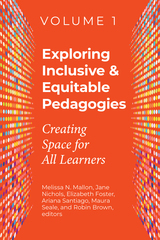
Exploring Inclusive & Equitable Pedagogies
Creating Space for All Learners
Melissa Mallon
Assoc of College & Research Libraries, 2023
Inclusive and equity-minded pedagogy is inspired by a rich array of theories including Black feminist thought, critical race theory, cultural humility, cultural competence, disabilities studies, universal design for learning, and critical information literacy. When we base our instruction on inclusive and equitable pedagogies, we endeavor to connect authentically with students as well as to connect classroom learning to the context of their lives. We share power with students, centering them and their varied learning preferences, and strive to create a culture of care, empathy, and humility both in and out of the classroom. When we clearly share our objectives and expectations for a learning experience, students may better understand us and the learning context we aspire to create.
In Exploring Inclusive & Equitable Pedagogies: Creating Space for All Learners, seven thorough sections across two volumes examine:
Chapters cover topics including dismantling, reexamining, and reconstructing notions of authority in information literacy instruction; teaching technology inclusively; using primary sources to research queer and feminist histories; cocreating knowledge practices with students; prioritizing accessibility in synchronous and asynchronous learning environments; cultural humility, funds of knowledge, and information literacy instruction with first-generation students; designing and managing inclusive group projects; and much more.
To become the instructors our students need, we must adopt the mindsets and develop the underlying skills to enact inclusive and equitable teaching and learning. Exploring Inclusive & Equitable Pedagogies offers reflections, practices, and models that deepen our collective understanding of equitable and inclusive theories and practices and present new grounding for both our individual teaching and our instruction programs.
In Exploring Inclusive & Equitable Pedagogies: Creating Space for All Learners, seven thorough sections across two volumes examine:
- Anti-Racist Approaches
- Intentional Information Literacy
- Engendering Care and Empathy
- Community Building
- Universal Design for Learning: An Important Benchmark
- Instructor Identity and Positionality
- Professional Development
Chapters cover topics including dismantling, reexamining, and reconstructing notions of authority in information literacy instruction; teaching technology inclusively; using primary sources to research queer and feminist histories; cocreating knowledge practices with students; prioritizing accessibility in synchronous and asynchronous learning environments; cultural humility, funds of knowledge, and information literacy instruction with first-generation students; designing and managing inclusive group projects; and much more.
To become the instructors our students need, we must adopt the mindsets and develop the underlying skills to enact inclusive and equitable teaching and learning. Exploring Inclusive & Equitable Pedagogies offers reflections, practices, and models that deepen our collective understanding of equitable and inclusive theories and practices and present new grounding for both our individual teaching and our instruction programs.
[more]
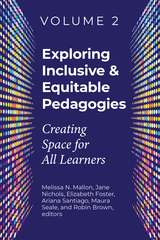
Exploring Inclusive & Equitable Pedagogies
Creating Space for All Learners
Melissa Mallon
Assoc of College & Research Libraries, 2023
Inclusive and equity-minded pedagogy is inspired by a rich array of theories including Black feminist thought, critical race theory, cultural humility, cultural competence, disabilities studies, universal design for learning, and critical information literacy. When we base our instruction on inclusive and equitable pedagogies, we endeavor to connect authentically with students as well as to connect classroom learning to the context of their lives. We share power with students, centering them and their varied learning preferences, and strive to create a culture of care, empathy, and humility both in and out of the classroom. When we clearly share our objectives and expectations for a learning experience, students may better understand us and the learning context we aspire to create.
In Exploring Inclusive & Equitable Pedagogies: Creating Space for All Learners, seven thorough sections across two volumes examine:
Chapters cover topics including dismantling, reexamining, and reconstructing notions of authority in information literacy instruction; teaching technology inclusively; using primary sources to research queer and feminist histories; cocreating knowledge practices with students; prioritizing accessibility in synchronous and asynchronous learning environments; cultural humility, funds of knowledge, and information literacy instruction with first-generation students; designing and managing inclusive group projects; and much more.
To become the instructors our students need, we must adopt the mindsets and develop the underlying skills to enact inclusive and equitable teaching and learning. Exploring Inclusive & Equitable Pedagogies offers reflections, practices, and models that deepen our collective understanding of equitable and inclusive theories and practices and present new grounding for both our individual teaching and our instruction programs.
In Exploring Inclusive & Equitable Pedagogies: Creating Space for All Learners, seven thorough sections across two volumes examine:
- Anti-Racist Approaches
- Intentional Information Literacy
- Engendering Care and Empathy
- Community Building
- Universal Design for Learning: An Important Benchmark
- Instructor Identity and Positionality
- Professional Development
Chapters cover topics including dismantling, reexamining, and reconstructing notions of authority in information literacy instruction; teaching technology inclusively; using primary sources to research queer and feminist histories; cocreating knowledge practices with students; prioritizing accessibility in synchronous and asynchronous learning environments; cultural humility, funds of knowledge, and information literacy instruction with first-generation students; designing and managing inclusive group projects; and much more.
To become the instructors our students need, we must adopt the mindsets and develop the underlying skills to enact inclusive and equitable teaching and learning. Exploring Inclusive & Equitable Pedagogies offers reflections, practices, and models that deepen our collective understanding of equitable and inclusive theories and practices and present new grounding for both our individual teaching and our instruction programs.
[more]
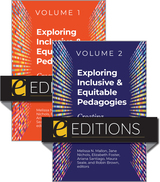
Exploring Inclusive & Equitable Pedagogies
Creating Space for All Learners, 2 volume set
Melissa Mallon
Assoc of College & Research Libraries, 2023
Inclusive and equity-minded pedagogy is inspired by a rich array of theories including Black feminist thought, critical race theory, cultural humility, cultural competence, disabilities studies, universal design for learning, and critical information literacy. When we base our instruction on inclusive and equitable pedagogies, we endeavor to connect authentically with students as well as to connect classroom learning to the context of their lives. We share power with students, centering them and their varied learning preferences, and strive to create a culture of care, empathy, and humility both in and out of the classroom. When we clearly share our objectives and expectations for a learning experience, students may better understand us and the learning context we aspire to create.
In Exploring Inclusive & Equitable Pedagogies: Creating Space for All Learners, seven thorough sections across two volumes examine:
Chapters cover topics including dismantling, reexamining, and reconstructing notions of authority in information literacy instruction; teaching technology inclusively; using primary sources to research queer and feminist histories; cocreating knowledge practices with students; prioritizing accessibility in synchronous and asynchronous learning environments; cultural humility, funds of knowledge, and information literacy instruction with first-generation students; designing and managing inclusive group projects; and much more.
To become the instructors our students need, we must adopt the mindsets and develop the underlying skills to enact inclusive and equitable teaching and learning. Exploring Inclusive & Equitable Pedagogies offers reflections, practices, and models that deepen our collective understanding of equitable and inclusive theories and practices and present new grounding for both our individual teaching and our instruction programs.
In Exploring Inclusive & Equitable Pedagogies: Creating Space for All Learners, seven thorough sections across two volumes examine:
- Anti-Racist Approaches
- Intentional Information Literacy
- Engendering Care and Empathy
- Community Building
- Universal Design for Learning: An Important Benchmark
- Instructor Identity and Positionality
- Professional Development
Chapters cover topics including dismantling, reexamining, and reconstructing notions of authority in information literacy instruction; teaching technology inclusively; using primary sources to research queer and feminist histories; cocreating knowledge practices with students; prioritizing accessibility in synchronous and asynchronous learning environments; cultural humility, funds of knowledge, and information literacy instruction with first-generation students; designing and managing inclusive group projects; and much more.
To become the instructors our students need, we must adopt the mindsets and develop the underlying skills to enact inclusive and equitable teaching and learning. Exploring Inclusive & Equitable Pedagogies offers reflections, practices, and models that deepen our collective understanding of equitable and inclusive theories and practices and present new grounding for both our individual teaching and our instruction programs.
[more]

The Grounded Instruction Librarian
Participating in The Scholarship of Teaching and Learning
Melissa Mallon
Assoc of College & Research Libraries, 2019

Open And Equitable Scholarly Communication Creating A More
Nancy Maron
Assoc of College & Research Libraries, 2019

Rewired
Research-Writing Partnerships Within The
Randall McClure
Assoc of College & Research Libraries, 2016
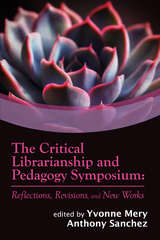
The Critical Librarianship and Pedagogy Symposium
Reflections, Revisions, and New Works
Yvonne Mery
Assoc of College & Research Libraries, 2023
Academic librarianship is due for a major paradigm shift in response to the existential threats facing the library profession and higher education, and library workers are leading this shift with new ideas about community, feminism, education, and social change.
The Critical Librarianship and Pedagogy Symposium: Reflections, Revisions, and New Works collects expanded and updated presentations given at the Critical Librarianship and Pedagogy Symposium (CLAPS) held biennially at the University of Arizona Libraries. This anthology provides a toolkit for critical library pedagogy that recognizes how knowledge is created within historical and deeply politicized contexts. Authors working in library or disciplinary teaching fields explore intersections between information literacy and critical pedagogy and provide current thinking, assessment, and reflection on their practices of teaching students how to recognize and critique the oppressive power structures inherent in educational systems. The work done by librarians is analyzed to reveal the socioeconomic frameworks that drive the costs of our labor.
Divided into five parts—Critical Pedagogies in the Classroom, Feminist Library Practices, The Labor of Librarianship, Practices of Care, and Community Archives—chapters include explorations of the advent of neoliberalism in higher education, social justice, white fragility, supporting neurodivergence in education, and disability-rights activism. They use lenses such as queer, intersectional, feminist, and critical race theory to examine subjects, and include practices for sustainable teaching, facilitating dialogue in the classroom, and using tools such as user experience or empathic design. The Critical Librarianship and Pedagogy Symposium offers ways to incorporate critical pedagogy theory into your own practices as educators, both within the library and in higher education in general.
The Critical Librarianship and Pedagogy Symposium: Reflections, Revisions, and New Works collects expanded and updated presentations given at the Critical Librarianship and Pedagogy Symposium (CLAPS) held biennially at the University of Arizona Libraries. This anthology provides a toolkit for critical library pedagogy that recognizes how knowledge is created within historical and deeply politicized contexts. Authors working in library or disciplinary teaching fields explore intersections between information literacy and critical pedagogy and provide current thinking, assessment, and reflection on their practices of teaching students how to recognize and critique the oppressive power structures inherent in educational systems. The work done by librarians is analyzed to reveal the socioeconomic frameworks that drive the costs of our labor.
Divided into five parts—Critical Pedagogies in the Classroom, Feminist Library Practices, The Labor of Librarianship, Practices of Care, and Community Archives—chapters include explorations of the advent of neoliberalism in higher education, social justice, white fragility, supporting neurodivergence in education, and disability-rights activism. They use lenses such as queer, intersectional, feminist, and critical race theory to examine subjects, and include practices for sustainable teaching, facilitating dialogue in the classroom, and using tools such as user experience or empathic design. The Critical Librarianship and Pedagogy Symposium offers ways to incorporate critical pedagogy theory into your own practices as educators, both within the library and in higher education in general.
[more]

Librarians Serving Diverse Populations
Challenges And
Lori Mestre
Assoc of College & Research Libraries, 2011

Librarians Serving Diverse Populations
Challenges and Opportunities
Lori Mestre
Assoc of College & Research Libraries, 2011

Toxic Dynamics
Disrupting, Dismantling, and Transforming Academic Library Culture
Russell Michalak
Assoc of College & Research Libraries, 2024
Academic libraries are full of inspiring collections, resources, and services, but libraries are special because of the people who run them. And what people believe about and face in their culture impacts ideas, plans, and outcomes. Academic library workers face many contemporary challenges that contribute to toxic work cultures—the rapid change of higher education, diminishing resources, lack of diversity, power hierarchies—and addressing these problems requires innovative solutions, ongoing professional development, and effective leadership.
Toxic Dynamics: Disrupting, Dismantling, and Transforming Academic Library Culture provides practical solutions for confronting these complex issues and innovative ways to promote a healthy and sustainable work culture. It addresses critical and timely challenges such as faculty versus staff or us versus them mentality, unionization, gendered labor, organizational change, self-care, tenure, and promotion. Authors from all sizes and types of academic libraries provide evidence-based solutions to mitigate the negative effects of toxicity, change management strategies, and ways to confront and challenge values that harm library workers and their well-being.
By understanding the root causes of toxic cultures, recognizing their impact, and implementing solutions, leaders can create a more supportive and positive work environment and improve morale, retention, and productivity. Toxic Dynamics is an important resource for anyone interested in improving workplace culture and addressing issues related to toxicity and inequity, and for library leaders at all levels.
Toxic Dynamics: Disrupting, Dismantling, and Transforming Academic Library Culture provides practical solutions for confronting these complex issues and innovative ways to promote a healthy and sustainable work culture. It addresses critical and timely challenges such as faculty versus staff or us versus them mentality, unionization, gendered labor, organizational change, self-care, tenure, and promotion. Authors from all sizes and types of academic libraries provide evidence-based solutions to mitigate the negative effects of toxicity, change management strategies, and ways to confront and challenge values that harm library workers and their well-being.
By understanding the root causes of toxic cultures, recognizing their impact, and implementing solutions, leaders can create a more supportive and positive work environment and improve morale, retention, and productivity. Toxic Dynamics is an important resource for anyone interested in improving workplace culture and addressing issues related to toxicity and inequity, and for library leaders at all levels.
[more]
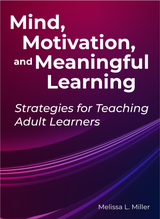
Mind, Motivation, and Meaningful Learning
Melissa Lynn Miller
Assoc of College & Research Libraries, 2021
Adults are attending college in record numbers every year. These students, many with families and careers, may have been away from an academic environment for many years and have unique needs in developing lifelong learning skills. Academic librarians have an important role as change agents in this dynamic learning environment through information literacy instruction, workshops, and individual consultations.
Mind, Motivation, and Meaningful Learning: Strategies for Teaching Adult Learners provides a blueprint that academic librarians can apply to their instructional design that facilitates a change in students’ motivation and learning strategies. It provides the tools necessary to teach learners to identify, evaluate, and apply appropriate cognitive, learning, and motivation strategies based on course content and a deeper understanding of the metacognitive component of meaningful learning. Five chapters explore the theories behind adult learning, culminating in a seven-unit curriculum scalable to a variety of learning domains complete with lesson plans, activities, assessments of the learning goals, and student reflections.
Mind, Motivation, and Meaningful Learning can help you identify the components of academic learning that contribute to high achievement; help students learn and practice effective learning and study strategies that lead to improved self-efficacy, self-regulation, and knowledge transfer; and improve instructional design for student, instructor, and academic teaching librarian success.
Mind, Motivation, and Meaningful Learning: Strategies for Teaching Adult Learners provides a blueprint that academic librarians can apply to their instructional design that facilitates a change in students’ motivation and learning strategies. It provides the tools necessary to teach learners to identify, evaluate, and apply appropriate cognitive, learning, and motivation strategies based on course content and a deeper understanding of the metacognitive component of meaningful learning. Five chapters explore the theories behind adult learning, culminating in a seven-unit curriculum scalable to a variety of learning domains complete with lesson plans, activities, assessments of the learning goals, and student reflections.
Mind, Motivation, and Meaningful Learning can help you identify the components of academic learning that contribute to high achievement; help students learn and practice effective learning and study strategies that lead to improved self-efficacy, self-regulation, and knowledge transfer; and improve instructional design for student, instructor, and academic teaching librarian success.
[more]

Reviewing The Academic Library
A Guide To Self-Study And Ex
Eleanor Mitchell
Assoc of College & Research Libraries, 2015

Reviewing the Academic Library
A Guide to Self-Study and External Review
Eleanor Mitchell
Assoc of College & Research Libraries, 2015

Past Or Portal? Enhancing Undergraduate Learning Through
Eleanor Mitchell
Assoc of College & Research Libraries, 2012

Past or Portal
Enhancing Undergraduate Learning through Special Collections and Archives
Eleanor Mitchell
Assoc of College & Research Libraries, 2012

The Critical Thinking About Sources Cookbook
Sarah E. Morris
Assoc of College & Research Libraries, 2020

Unframing the Visual
Visual Literacy Pedagogy in Academic Libraries and Information Spaces
Maggie Murphy
Assoc of College & Research Libraries, 2023
Visual literacy is an interconnected set of practices, habits, and values for participating in visual culture that can be developed through critical, ethical, reflective, and creative engagement with visual media. Approaches to teaching visual literacy in higher education must include a focus on context and not just content, process and not just product, impact and not just intent. Unframing is an approach to visual literacy pedagogy that acknowledges that visuals are a pervasive part of everyday life, as well as embedded into every scholarly discipline.
In four parts, Unframing the Visual: Visual Literacy Pedagogy in Academic Libraries and Information Spaces explores:
Twenty-four full color chapters present a range of theoretical and practical approaches to visual literacy pedagogy that illustrate, connect with, extend, and criticize concepts from the Framework for Visual Literacy in Higher Education: Companion Document to the Framework for Information Literacy for Higher Education. Topics include using TikTok to begin a conversation on academic honesty and marginalization; supporting disciplines to move to multimodal public communication assignments; critical data visualization; and exclusionary practices in visual media.
In exploring the discussions and engaging with the activities in Unframing the Visual, you will find new inspiration for how to unframe, adapt, and apply visual literacy pedagogy and praxis in your work.
In four parts, Unframing the Visual: Visual Literacy Pedagogy in Academic Libraries and Information Spaces explores:
- Participating in a Changing Visual Information Landscape
- Perceiving Visuals as Communicating Information
- Practicing Visual Discernment and Criticality
- Pursuing Social Justice through Visual Practice
Twenty-four full color chapters present a range of theoretical and practical approaches to visual literacy pedagogy that illustrate, connect with, extend, and criticize concepts from the Framework for Visual Literacy in Higher Education: Companion Document to the Framework for Information Literacy for Higher Education. Topics include using TikTok to begin a conversation on academic honesty and marginalization; supporting disciplines to move to multimodal public communication assignments; critical data visualization; and exclusionary practices in visual media.
In exploring the discussions and engaging with the activities in Unframing the Visual, you will find new inspiration for how to unframe, adapt, and apply visual literacy pedagogy and praxis in your work.
[more]
READERS
Browse our collection.
PUBLISHERS
See BiblioVault's publisher services.
STUDENT SERVICES
Files for college accessibility offices.
UChicago Accessibility Resources
home | accessibility | search | about | contact us
BiblioVault ® 2001 - 2024
The University of Chicago Press









